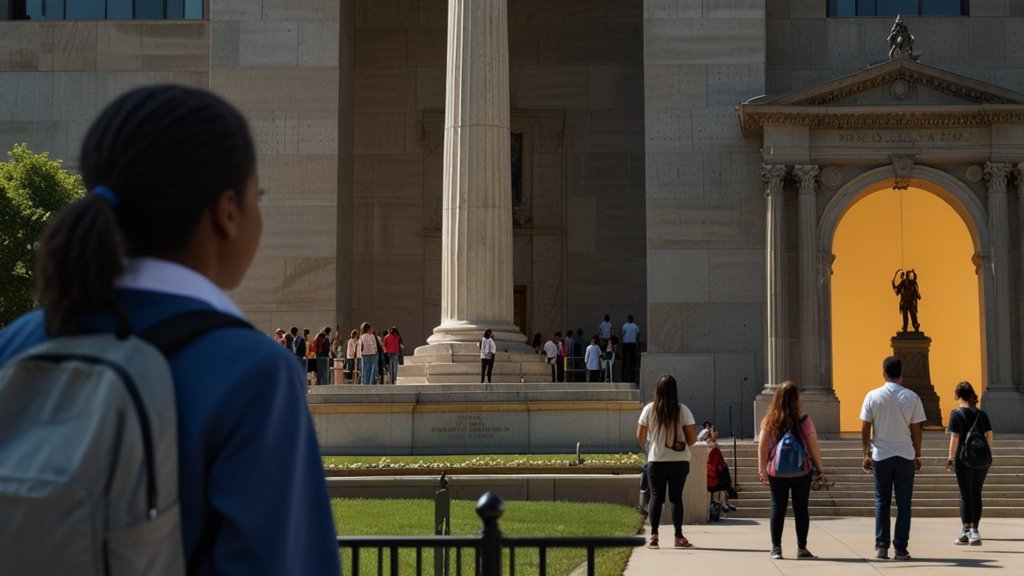Imagine federal grants, painstakingly secured to offer a glimmer of normalcy and educational enrichment to children facing the profound instability of homelessness. Now, picture those funds diverted – not for textbooks or field trips to museums, but for personal family vacations to Disney World, paid for by the very system meant to protect these vulnerable kids. This isn’t a dystopian plot; it’s the disturbing reality uncovered in the case involving Linda Wilson NYC Dept of Education, a former manager entrusted with supporting Queens’ most at-risk students.
Linda Wilson served as the Queens Regional Manager for the NYC Department of Education’s critical “Students in Temporary Housing” (STH) program. Her mandate was clear: utilize federal McKinney-Vento Act grants to provide stability and enriching experiences – like educational trips – for students grappling with homelessness. Instead, investigators allege that between 2016 and 2019, Wilson orchestrated a scheme that blatantly betrayed that mission, exploiting the children she was hired to serve.
The Crucial Role Wilson Held: Gatekeeper for Vulnerable Kids
Wilson’s position within the NYC Dept of Education wasn’t just administrative; it was pivotal. As the STH Regional Manager for Queens, she controlled access to significant federal funding earmarked specifically for students experiencing homelessness. This included organizing and approving federally subsidized enrichment trips designed to:
- Provide educational experiences outside the classroom.
- Offer respite and positive memories during highly stressful times.
- Foster a sense of normalcy and inclusion.
- Connect students with potential college pathways.
This role demanded the highest levels of integrity and accountability. Tragically, according to investigators, that trust was systematically violated.
The Alleged Scheme: Forged Slips, Fake Visits & Family Vacations
The core allegations against Linda Wilson and subordinate staff paint a picture of calculated deception:
- Forging the Foundation: Investigators claim Wilson and her staff fabricated permission slips. They allegedly forged students’ names on documents authorizing participation in trips that these students never actually attended.
- Diverting the Dollars: With forged permissions creating a paper trail, the federal grant money allocated for those phantom student spots was allegedly diverted. Instead of funding homeless students, these public funds were used to cover the costs of trips for Wilson’s own family members and the families of her subordinates.
- Luxury Destinations on the Public Dime: Where did these taxpayer-funded “educational” trips go? Destinations included:
- Walt Disney World Resort (Florida)
- Washington, D.C.
- New Orleans
- Atlanta
- Philadelphia
- Evading Oversight: To avoid internal scrutiny within the NYC Dept of Education, Wilson allegedly utilized an outside vendor to facilitate these trips. This bypassed standard departmental controls and procurement procedures designed to prevent misuse.
- The Phantom College Tours: Perhaps adding insult to injury, investigators found Wilson submitted documentation and charged expenses for purported college visits that simply never occurred. These fabricated educational justifications were used to legitimize the misuse of funds further.
Intended Use vs. Actual Misuse of STH Funds
| Feature | Intended Purpose (McKinney-Vento Grants) | Alleged Misuse by Linda Wilson & Staff |
|---|---|---|
| Beneficiaries | Students identified as homeless or in temporary housing | Family members of Linda Wilson and subordinate staff |
| Trip Types | Educational enrichment, college visits, cultural experiences | Luxury vacations (Disney World, New Orleans, etc.) |
| Authorization | Legitimate student permission slips & parental consent | Forged student signatures on permission slips |
| Oversight | Internal DOE procurement and approval processes | Use of an outside vendor to bypass internal controls |
| Justification | Documented educational value & alignment with STH goals | Fabricated college visits; false educational claims |
| Accountability | Strict reporting to state/federal authorities; audits | Concealment through falsified records & external vendor |
Also Read: Chegg Expert Login: Your Gateway to Shaping the Future of Education
The Unraveling: How the Fraud Was Exposed
While the exact trigger isn’t always public, such schemes often collapse under their own weight or through internal audits and whistleblowers. In this case:
- Internal Reviews & Audits: Suspicious patterns in trip documentation, expenditures, and vendor relationships likely raised red flags during internal NYC Dept of Education audits or financial reviews. Discrepancies between reported student participation and actual attendance records would be a major indicator.
- Special Commissioner of Investigation (SCI): The NYC Department of Education’s independent watchdog, the SCI, launched a formal investigation based on these concerns. Their investigators have broad authority to subpoena records, interview witnesses, and uncover misconduct.
- Findings of the Probe: The SCI investigation reportedly uncovered substantial evidence supporting the allegations of forged documents, diverted funds for personal travel, use of an outside vendor to evade oversight, and falsified trip justifications.
The Consequences: Termination, Repayment, and Systemic Scrutiny
The fallout from the investigation into Linda Wilson NYC Dept of Education was severe and far-reaching:
- Recommended Termination: The SCI investigators concluded their probe by recommending that the NYC Dept of Education terminate Linda Wilson’s employment immediately. Such recommendations carry significant weight and are almost always acted upon by the DOE Chancellor.
- Demand for Repayment: Recognizing the direct financial harm to taxpayers and the misappropriation of funds meant for children, the SCI also recommended that Wilson and involved staff be required to reimburse the DOE for all misused grant money. The exact total amount sought hasn’t been publicly detailed but likely encompasses trip costs, vendor fees, and associated expenses.
- Broader Program Review: Scandals like this inevitably trigger intense scrutiny of the entire program involved. The STH program in Queens, and potentially citywide, would have undergone rigorous reviews of its financial controls, oversight mechanisms, vendor management, and approval processes to prevent future abuses.
- Damage to Trust: Beyond the financial and personnel consequences, the most profound damage is to the trust placed in the system by vulnerable families and the public. Incidents like this undermine confidence in critical support programs.
Lessons Learned: Safeguarding Funds for the Most Vulnerable
The Linda Wilson NYC Dept of Education case serves as a stark, painful lesson in the necessity of robust oversight, especially when managing funds designated for society’s most vulnerable members.
- Enhanced Controls: This case underscores the critical need for multi-layered approval processes for expenditures, particularly when using outside vendors. Requiring multiple signatures, independent verification of participant lists, and pre- and post-trip audits are essential.
- Vigilant Oversight: Internal auditors and watchdog bodies like the SCI play an indispensable role. Their work must be supported and their findings acted upon decisively.
- Whistleblower Protection: Creating safe, anonymous channels for employees or community members to report suspected fraud or misuse is crucial for early detection.
- Transparency: While protecting student privacy, greater transparency about how grant funds are allocated and spent within programs like STH can deter misuse and build public trust.
- Culture of Accountability: Fostering an organizational culture where ethical conduct is paramount, and accountability is enforced at all levels, is the bedrock defense against such breaches.
You May Also Read: myfairmontstate: Your Digital Gateway to Success at Fairmont State University
Conclusion
The alleged actions of Linda Wilson NYC Dept of Education, as detailed by investigators, represent a profound betrayal – of homeless students desperate for stability and opportunity, of taxpayers funding essential services, and of the educators and staff committed to this vital work. While the recommended termination and demand for repayment are necessary steps towards justice, the true measure of success lies in the systemic reforms implemented afterward.
Protecting public funds, especially those earmarked for children in crisis, requires unwavering vigilance, transparent processes, and a culture of absolute integrity. The NYC Dept of Education must ensure that the safeguards born from this scandal are robust and enduring, guaranteeing that every dollar dedicated to Students in Temporary Housing reaches its intended destination: supporting the education and well-being of New York City’s most vulnerable youth. The lesson is clear: trust is essential, but verification is non-negotiable.
FAQs
What was Linda Wilson’s job at the NYC Department of Education?
Linda Wilson was the Regional Manager for the “Students in Temporary Housing” (STH) program in Queens. She oversaw the use of federal grants to support homeless students, including organizing educational trips.
What exactly is Linda Wilson accused of doing?
Investigators allege that between 2016 and 2019, Wilson and her staff forged student permission slips and diverted federal grant money intended for homeless students. This money was allegedly used to pay for vacations for Wilson’s own family members and staff families to places like Disney World, Washington D.C., and New Orleans, using an outside vendor to avoid oversight. They also allegedly fabricated college visits.
What happened to Linda Wilson after the investigation?
The NYC Department of Education’s Special Commissioner of Investigation (SCI) recommended that Linda Wilson be terminated from her position. They also recommended that she and involved staff be required to repay all misused funds to the DOE.
Were students directly harmed by this scheme?
While specific students may not have been individually targeted for harm, the scheme directly harmed the population of homeless students in Queens. Funds specifically allocated to provide them with educational enrichment and respite experiences were stolen, depriving them of those opportunities. It also damages trust in the support systems meant to help them.
How was the fraud discovered?
While specifics aren’t always public, such schemes are typically uncovered through internal audits by the NYC DOE, financial reviews that reveal discrepancies, reports from whistleblowers, or investigations triggered by suspicious patterns. The SCI conducted the formal investigation.
What changes were likely made because of this scandal?
The scandal undoubtedly triggered a rigorous review of the STH program’s financial controls, vendor management processes, trip approval procedures, and oversight mechanisms within the NYC DOE. Enhanced safeguards, like stricter multi-person approvals, verified participant lists, and more frequent audits, were likely implemented to prevent future misuse.
What is the Students in Temporary Housing (STH) program?
The STH program is mandated by the federal McKinney-Vento Act. It ensures that students experiencing homelessness (living in shelters, cars, motels, doubled-up with others, etc.) have equal access to free public education and support services, including transportation, school supplies, and academic support. The enrichment trips involved in this case were part of those support services funded by grants.










